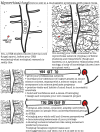You are welcome here: A practical guide to diversity, equity, and inclusion for undergraduates embarking on an ecological research experience
- PMID: 33898016
- PMCID: PMC8057333
- DOI: 10.1002/ece3.7321
You are welcome here: A practical guide to diversity, equity, and inclusion for undergraduates embarking on an ecological research experience
Abstract
As we build a more diverse, equitable, and inclusive culture in the ecological research community, we must work to support new ecologists by empowering them with the knowledge, tools, validation, and sense of belonging in ecology to succeed. Undergraduate research experiences (UREs) are critical for a student's professional and interpersonal skill development and key for recruiting and retaining students from diverse groups to ecology. However, few resources exist that speak directly to an undergraduate researcher on the diversity, equity, and inclusion (DEI) dimensions of embarking on a first research experience. Here, we write primarily for undergraduate readers, though a broader audience of readers, especially URE mentors, will also find this useful. We explain many of the ways a URE benefits undergraduate researchers and describe how URE students from different positionalities can contribute to an inclusive research culture. We address three common sources of anxiety for URE students through a DEI lens: imposter syndrome, communicating with mentors, and safety in fieldwork. We discuss the benefits as well as the unique vulnerabilities and risks associated with fieldwork, including the potential for harassment and assault. Imposter syndrome and toxic field experiences are known to drive students, including students from underrepresented minority groups, out of STEM. Our goal is to encourage all students, including those from underrepresented groups, to apply for UREs, build awareness of their contributions to inclusion in ecology research, and provide strategies for overcoming known barriers.
Keywords: diversity; ecology; equity; inclusion; undergraduate research experience.
© 2021 The Authors. Ecology and Evolution published by John Wiley & Sons Ltd.
Conflict of interest statement
None declared.
Figures


References
-
- ADVANCEGeo Partnership . (2019). In the field. ADVANCEGeo Partnership. Retrieved from https://serc.carleton.edu/advancegeo/resources/field_work.html
-
- ADVANCEGeo Partnership (2020). Codes of conduct. ADVANCEGeo Partnership. Retrieved from https://serc.carleton.edu/207402
-
- Archie, T. , & Laursen, S. (2013). Executive summary: Summative report on the Earth Science Women's Network (ESWN) NSF ADVANCE PAID collaborative award (2009–2013). Ethnography and Evaluation Research, Boulder, Colorado. Retrieved from https://www.colorado.edu/eer/sites/default/files/attached‐files/eswnfina.... Accessed February 21, 2021.
-
- Arnold, A. C. , Wilkins‐Yel, K. G. , Bekki, J. M. , Bernstein, B. L. , Natarajan, M. , Randall, A. K. , Francies, R. , & Okwu, C. E. (2020). Examining the effects of STEM climate on the mental health of graduate women from diverse racial/ethnic backgrounds. In American Society for Engineering Education Conference Proceedings. 10.18260/1-2--34617 - DOI
Grants and funding
LinkOut - more resources
Full Text Sources
Other Literature Sources
Research Materials

